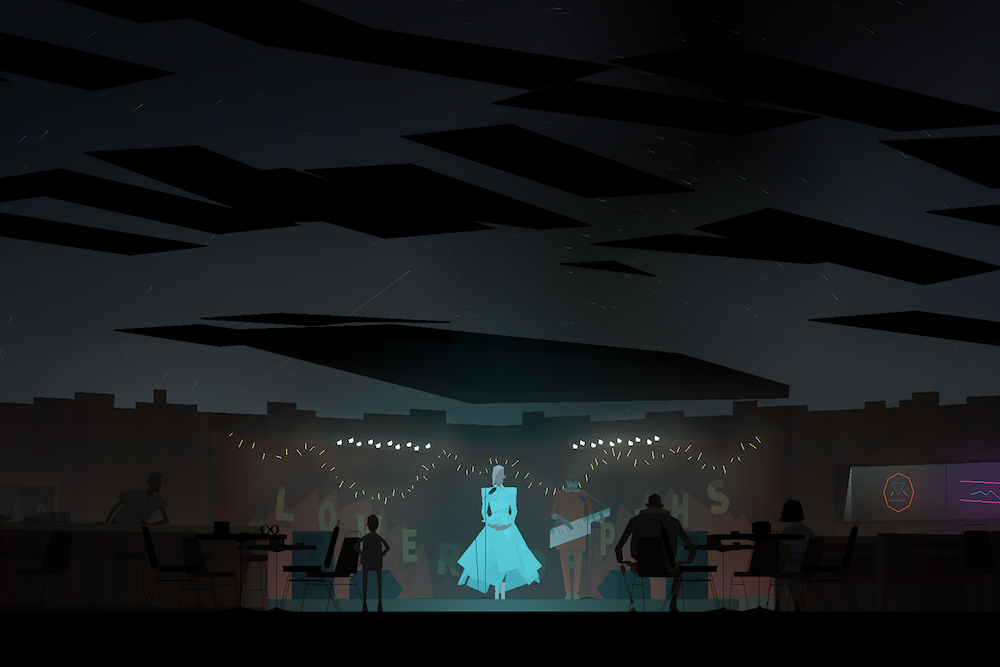Kentucky Route Zero is haunted in the same way America is haunted. In this five-act play of a video game, the characters Conway and Shannon and their bizarre companions amble back and forth, around and through the real and unreal roads and rivers of rural Kentucky. Everyone has a goal of some sort—delivering one last antique, finding a new workshop, reaching another gig—but all of it folds into the layers of this dreamscape underworld. Just as so many Latin American writers took inspiration from Faulkner, the Southern Gothic of Kentucky Route Zero takes inspiration right back from the magic realism of García Márquez and the pointed political artistry of Neruda. The hopeful folk songs of miners punctuate Kentucky’s caves and forests as their ghosts come out to perform again, long past their deaths at the hands of corporate greed and negligence. Artists and blue-collar workers alike become trapped by exploitative debts that never stop following them. At the heart of Kentucky Route Zero is the mounting fear that these specters are not from the past or even the present but exist eternally. There never were good old days because America’s been stuck in the same cycle since its inception. Any memory of this land is phantom-ridden and cyclical; as Conway says at one point, “I can’t look at anything without remembering something else, and then that reminds me of something else, and—I’m buried in it.” In another scene, a minor character asks, as they’re digging a grave: “Just what are we burying here, anyway? Is it them, or us? Or some mix of both.” Kentucky Route Zero argues that in a sense, we all haunt America. Our debts, fears, and memories hang over others and this nation as much as they hang over us. No single change will exorcise the land, but perhaps by seeking out little slices of beauty where we can find them—little slices of togetherness—we can learn to live with the ghosts and respect them, for they are no different from us. —Carlos Zayas-Pons
My seven years in South Louisiana gave me an earful of music and a bellyful of food. I miss those parts of Louisiana always, but particularly during carnival season. In prepandemic, post-Louisiana times, I did what I could to get my fix. Two springs ago, my boyfriend’s friend’s friend shipped live crawfish to Brooklyn for a boil. Reader, I was the third attendee to arrive. I’ve sought out—and found—real andouille in Manhattan (served wafer-thin at Birdland) and tasted many New York City beignets—none met the standard set by Baton Rouge’s Coffee Call. But as this strange COVID carnival gets under way (Mardi Gras this year is on February 16), I do what I can to celebrate the season safely. Last week, USPS delivered a box of beads, a purple-and-green feather boa, and a box of king cake mix (baby included) from a friend who knew I’d be missing Louisiana right about now. The Venn diagram of pandemic beans and Monday red beans and rice overlaps nicely. And over the weekend, we put on WBRH, Baton Rouge Magnet High School’s public radio station. Dweeby as it sounds (and there are some adorable high school DJs on air midafternoon), the station’s Saturday music lineup is just what I need. Dancing ’round the sofa isn’t quite following a second line down the street, but it’s cheering all the same. —Emily Nemens
Sometimes it feels like every new novel these days is interested primarily in the concerns of the upper middle classes, their exploits and their triumphs. Thank God, then, for books like Douglas Stuart’s Shuggie Bain, which transports the reader to eighties Glasgow and follows the difficult childhood of its title character as he grows up gay and working class with an alcoholic parent. Like many alcoholics, Shuggie’s mother, Agnes, is both charismatic and brutal, capable of making her loved ones feel like the most special people in the room while simultaneously forcing them to witness and care after the slow suicide that is her addiction. Stuart is adept at portraying the power politics of both Glasgow, with its sectarian divides, and the world at large: a scene involving Shuggie’s elder sister’s impending move to apartheid-era South Africa illustrates how easy it can be for the oppressed to become the oppressors. And at the center of it all is Agnes: beautiful, funny, and capable of extraordinary interpersonal violence, doomed to repeat the cycle of her addiction on every page, save for “one good year,” as Shuggie heartbreakingly terms it. By its end, Shuggie Bain is a book about power: who has it, what it takes to get it, and how a lack of it will destroy a person just as much as an excess. —Rhian Sasseen
There are books you breeze through, books you dip into, books you devour, books you handle with care; Anushka Jasraj’s Principles of Prediction, a collection of stories currently available only in India, is the last. This sentence, in “Circus,” forced me to put the book away for an entire evening before I could go back to it: “Language is a rigged carnival game where the hoops are too small to fit around any of the prizes.” There is something eerie and prescient, and deeply discomfiting, about how Jasraj captures distance, disconnection, the breakdown of something so fundamental it is hard to put a word to; characters fail to reach each other or even to really reach themselves and generally seem not entirely certain they actually want to do so—because who knows what they will find there? If story, in general, is an attempt to create meaning and to communicate it—because a story is not a story until it is told—these powerful, precise stories are a look at what happens when you can no longer make that effort. —Hasan Altaf
It seems almost impossible that the opening poem of Khadijah Queen’s Anodyne, titled “In the Event of an Apocalypse, Be Ready to Die,” was written years ago rather than right now, on the occasion of this attenuated world ending, but it was. The book greets us with a prescient warning, readying us for a world “transformed but not really transformed”—but still, “remember galleries, gardens, / herbaria. Repositories of beauty now / ruin.” The whole collection progresses in iterations of this: transformations in which the world, then the body, feel untenable, but small things emerge to feed our hopes nonetheless. “Foolish I know,” Queen declares, “to try so many times / after spectacular failure,” and yet she walks this line of mournfulness and hope so expertly that she invites you to attempt it, too. And I cannot fathom that “The World Tells You Not to Expect the World” was written long before I encountered it, at this exact phase of life in which I need it, though the poem feels almost extemporaneous as it comes up from the page to say: “do it anyway—be made, all / out of love.” Every poem in Anodyne reminds me what a poem can do, what a poem should do, in how it gets to the details of personhood by attending so gorgeously to the details of the world. There are no empty sentiments; every permission to accept tenderness is hard earned. And there is no shying away from harshness when conjuring beauty or cultivating hope. “How we fail is how we continue,” Queen says. And we continue. —Langa Chinyoka
from The Paris Review https://ift.tt/3pxWzkP



Comments
Post a Comment